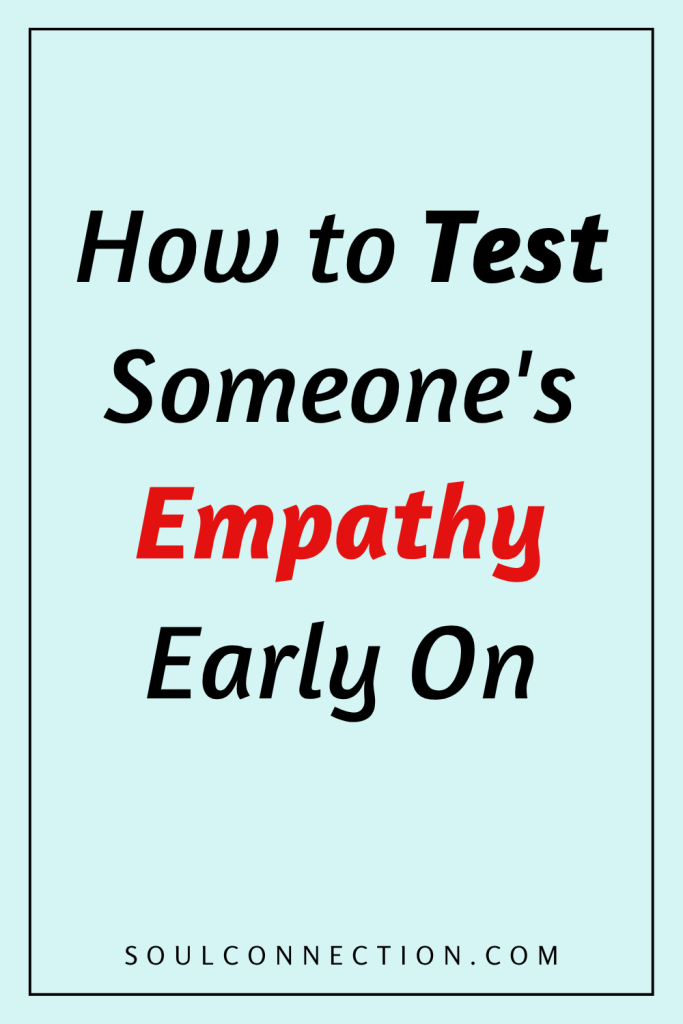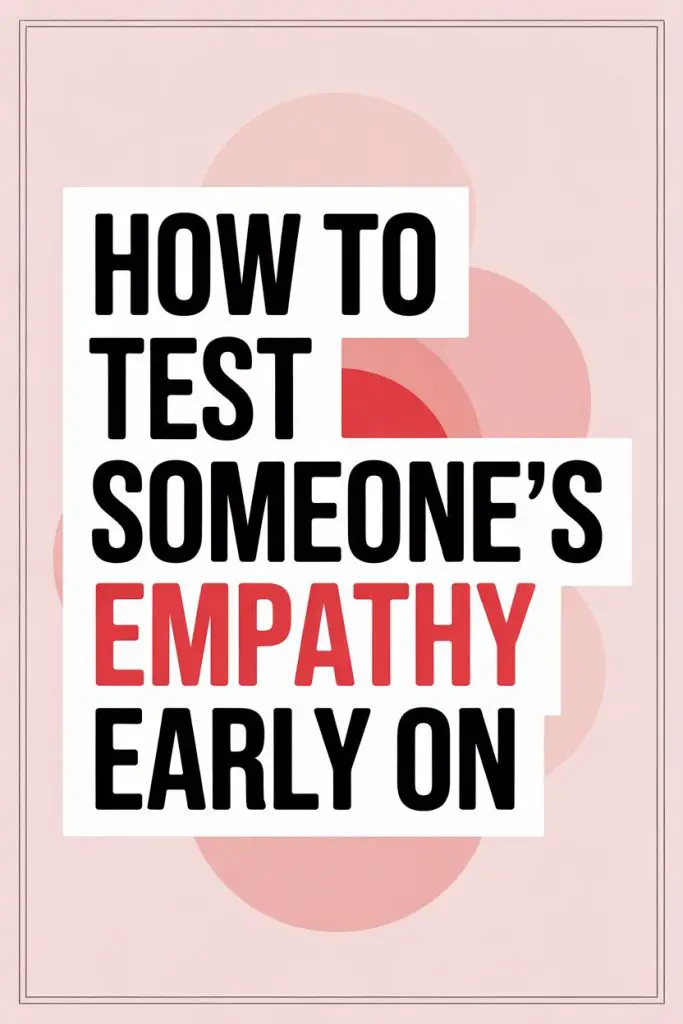Looking for empathy in a new flame or “friend” shouldn’t feel like you’re auditioning for a Broadway tragedy. And yet, here we are—trying to figure out if someone’s heart is an actual muscle or just a decorative accessory.
Empathy, that elusive cocktail of care and understanding, matters a lot more than whether someone can recite your coffee order.
The sooner you spot it (or its suspicious absence), the fewer times you’ll find yourself weeping into your pillow, questioning your taste in people.
Let’s skip the psychobabble and jump straight into the good stuff: how to spot empathy—or a glaring lack thereof—before you’re in too deep.
Ask About Their Worst Day
Someone’s response to pain (theirs, not yours…yet) tells you more than their entire Bumble profile ever could.
Share a story about a day when everything went pear-shaped. Watch for more than just polite nodding.
Do they ask thoughtful questions that show they’re actually in the story with you? Maybe they wince at the cringiest detail, or remark, “Wow, that sounds brutal.”
Bonus points if they don’t immediately pivot to their own tale of woe, making your story the opening act for their one-person show.
People with real empathy don’t just listen—they emotionally time-travel into your misery and pass you the tissues, even if only metaphorically.
Notice Their Interaction With Strangers
Empathy isn’t just reserved for people we fancy (or need something from).
Pay attention to how your person treats those who have nothing to offer them—a frazzled server, an elderly neighbor, a lost tourist with a map in panic mode.
Are they patient? Dismissive? Are they polite out of habit, or do they genuinely make an effort to put another human at ease?
If “please” and “thank you” only emerge when the tip’s at stake, maybe don’t expect them to show up when life gets messy.
Test Their Reactions To Vulnerability
Drop your guard, just a little. Talk about something that makes you nervous or embarrassed—something that requires a smidge of courage to admit.
Do they lean in? Offer reassurance? Maybe even share their own awkward moment to help you feel less exposed? Or do they joke it away, change the subject, or turn your confession into open-mic night?
Empathy doesn’t flinch when confronted with raw feelings. It stays in the awkward, holding your hand (or at the very least, not running for the fire exit).
Observe Their Response To Others’ Good News
Sure, empathy means being there when things fall apart. But it also means celebrating someone else’s wins without making it weird.
Mention a friend’s recent promotion, even if that friend is a total stranger to your date.
Signals to look for: Do they light up, ask questions, or offer a genuine, “Good for them!”? Or do they respond with a glazed-over “Oh, cool,” or—worse—a backhanded remark about how promotions aren’t what they used to be?
If their vibe is, “Your joy is my competition,” back away slowly.
Throw Them A Mild Moral Dilemma
Nothing like a pop quiz to spice up a new relationship.
Pose a simple, everyday ethical scenario—someone drops their wallet at the café, do you chase them down? The answer itself matters less than the discussion that follows.
Do they consider the feelings of the person who lost the wallet? Do they weigh the situation from different perspectives, or do they confidently declare, “Finders keepers!” like they’re starring in a playground remake?
Empathy means considering how someone else might feel, especially when there’s nothing to gain.
Check The Story Ratio
Conversation is a two-way street. Unless you’re sitting across from Narcissus himself, stories ought to be exchanged, not dictated.
Notice if they ask about your experiences and listen with genuine interest, or if they treat the date as a TED Talk featuring—surprise—themselves.
People with empathy don’t hog the spotlight. They know when to shut up and let someone else have the mic.
If you’re leaving each encounter feeling like an understudy in your own life story, maybe don’t book a second episode.
Gauge Their Willingness To Apologize
Nobody’s perfect. Even the most dazzling future ex will eventually mess up.
Pay attention to their willingness to apologize, even for small things. Did they interrupt you? Are they able to own up (“Sorry, I cut you off!”), or do they double down or deflect?
People who can’t apologize are usually allergic to empathy. Symptoms include chronic blame-shifting and a mysterious inability to ever be wrong.
Watch For “Empathy Theater”
Everyone wants to look good in the opening act. Early dates are filled with Oscar-worthy performances: rapt attention, supportive noises, the occasional hand-on-arm for dramatic effect.
Look for cracks in the act.
Do their words match their actions over time? Do they remember what you said last week, or do you find yourself re-introducing the same emotional details? Is their listening just a prop, or is it the real deal?
Empathy is less about perfect lines and more about showing up, even when the spotlight’s off.
Ask Their Opinion On Someone Else’s Struggle
Bring up a mutual acquaintance or a news story involving someone struggling—maybe a neighbor whose partner just left them, or a stranger in the headlines.
Notice whether their response is compassionate or judgmental. Do they quickly play armchair quarterback, blaming the victim, or do they express concern for the person’s feelings?
People who can imagine themselves in another’s shoes rarely stomp all over those shoes for fun.
Notice How They Handle Their Own Mistakes
When the Uber driver takes a wrong turn, or they spill coffee on their own lap, what happens? Empathy isn’t just about feeling for others—it’s about not making your own bad day everyone else’s problem.
Do they laugh it off? Apologize if their mistake affects you? Or do they lash out, blame the universe, or, heaven forbid, you?
Someone who handles mistakes with grace is likely to handle your rough days with equal care.
See If They Can Sit With Discomfort
Relationships aren’t all candlelit dinners and Instagrammable sunsets. Sometimes there’s sadness, awkwardness, or just those days where nothing makes sense.
Find a moment to be honest about something uncomfortable. Maybe you mention a personal loss, mental health wobble, or just feeling off. Someone with empathy won’t run.
They may not have the perfect words, but they’ll stay in the moment, willing to just be there—sometimes in silence.
If silence makes them reach for their phone or the emergency exit, take notes.
Bring Up Something That Annoys You
Keep it light. Maybe you mention how loud chewers drive you up the wall, or that you can’t stand people who ghost.
Watch their response. Do they chuckle and relate, or do they wave you off as “too sensitive”? Empathy means validating that everyone’s got quirks, pet peeves, and hypersensitivities—and that’s part of being human.
Comedians say timing is everything, but in relationships, validation’s the real punchline.
Ask About Their Childhood
No need to go full therapist. A casual, “What was your family like growing up?” opens the door.
Pay attention to how they talk about parents, siblings, or old friends. Is there warmth, understanding, even if their childhood wasn’t a fairy tale? Or is it a litany of blame, never a hint of seeing things from someone else’s side?
Empathy often starts early. If all their stories cast them as the eternal victim or lone hero, consider how that script might play out with you.
Notice How They Handle Boundaries
Set a tiny boundary—maybe you want to leave the bar early, or you ask for a bit of space on a stressful day.
Do they respect it, or push back? Someone with empathy can put their own wishes aside, at least temporarily, for the comfort of someone else. Personal boundaries aren’t hurdles—they’re part of the obstacle course.
If every “no” is met with sulking or guilt trips, you’re seeing the emotional equivalent of a toddler at bedtime.
Can They Laugh At Themselves?
Self-deprecating humor is empathy’s fun cousin.
Notice if they can gently poke fun at their own quirks or mistakes, or if every joke is at someone else’s expense. People who can laugh at themselves tend to have a keen sense of the human condition—messy, imperfect, but worthy of kindness.
If all their jokes punch down, be wary. Empathy never needs a victim.
What If The Empathy Is Missing?
If every sign points to “empathy not found”—don’t panic. Not everyone’s Prince(ss) Charming on day one, and nerves can be a thing.
But consistent lack of concern for others’ feelings, chronic blame, or an allergy to apologies? These are warning flares, not quirks.
You deserve someone who gets it—a partner who can laugh, cry, and cringe right along with you. Not someone who makes your feelings feel like an inconvenience.
And if all else fails, test their willingness to share the last slice of pizza. That’s empathy in its most delicious form.


